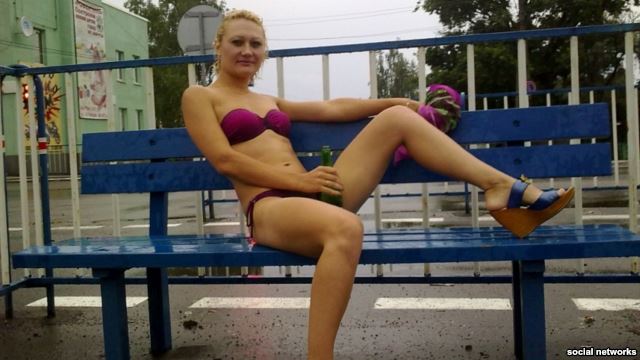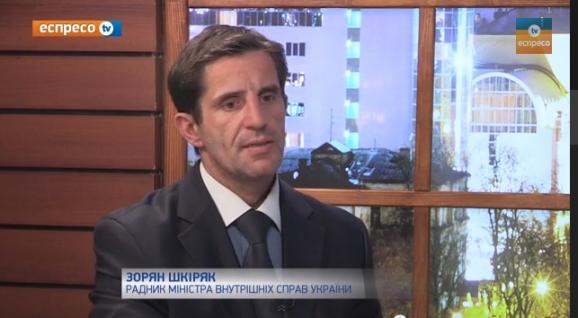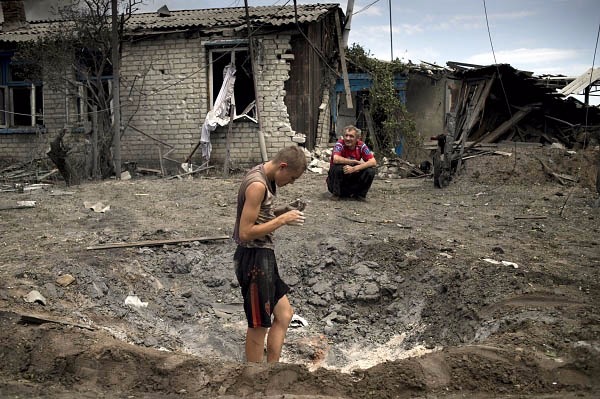A law was recently implemented in Ukraine's Russian-backed separatist enclave, the "Luhansk People's Republic" (LNR), which prescribes prosecution against journalists for “abusing their rights” and which regulates the distribution of erotic content.
Luhansk mercenaries have become concerned with information-related policies in the so-called ‘republic.’ On New Year’s Eve, the so-called ‘Law on Mass Media’ was published, wherein the local legislators included a point on “the unacceptability of abuse of the freedom of mass media” and developed a separate article regarding “exploitation of interest towards sex.”
In Luhansk, the capital of the terrorist group ‘LNR,’ there are still no criminal or customs ‘codes,’ as well as many other legal documents which would regulate the relations between the ‘citizens of the people’s republic.’ Almost all of the separatists’ orders act either outside of the boundaries of law, according to their own taste, or using Ukrainian legal acts.
Therefore, it is peculiar that the ‘LNR’ recently presented the ‘Law on Mass Media,’ which includes 81 entire articles.
Censure is unacceptable, however…
This document testifies to the extraordinary amount of attention the separatists pay to the sphere of information.
At the beginning of Russian-backed separatist rule in Ukraine's Donbas region, its leaders did everything in their power to make the work of independent media outlets in Luhansk close to impossible. The journalists were beaten and their equipment was damaged on purpose. For example, at the beginning of May 2014, only two out of seven camera crews of Ukrainian TV channels were able to stay in the city, withstanding the danger, and they left in June. Many Luhansk journalists have been in basement-located prisons and experienced ‘freedom of speech in LNR’ first-hand.
Now the 'republic's' self-proclaimed minister Igor Plotnitsky’s subordinates have created a ‘legal basis’ for the prosecution.
One of the main points of the ‘law’ is article 4, which declares the “unacceptability of abuse of the freedom of mass media”:
It is unacceptable to use media outlets with the goal of committing criminally punishable acts, to publicize information that constitute national or other kinds of secrets, which is especially protected by law, for the distribution of materials that contain public calls for terrorist activity or publicly justify terrorism, other extremist materials, as well as materials that propagate pornography, the cult of violence and cruelty, unhealthy lifestyles and materials that contain coarse language.
The previous ‘article of the Law’ declares the “unacceptability of censure.” Which is a double mockery of common sense: the present self-proclaimed authorities in Luhansk currently censure not only the contents of informational articles in the so-called ‘LNR media,’ but also hand out instructions on the time when the materials are to be published.
For example, the ideological workers of the ‘LNR’ frequently gather the editors of their controlled media to distribute detailed topic lists,. Lately, this happened on the eve of the ‘anti-blockade meeting’ in December [when city residents gathered to protest against the Ukrainian government suspending payments to separatist-controlled territories-ed]. Back then, Luhansk had protested the policies of the Kyiv government.

It is notable that the same specialists who had helped the Party of Regions [the party of the pro-Russian president Yanukovych ousted during the Euromaidan revolution-ed] maintain Luhansk oblast under their own control are currently conducting ideological work with the population and censoring media.
The head of ideology and public relations in the ‘LNR’ is member of the Luhansk Oblast Council Rodion Miroshnyk, former press secretary to former President Viktor Yanukovych, deputy head of the Oblast and long-time head of Luhansk Oblast TV. Miroshnyk is also close to Oleksandr Yefremov – since the early 2000’s he had been head of Luhansk PR structures belonging to this well-known Party of Regions member.
The gathering and instruction of editors and media owners had been practiced before by Luhansk Party of Regions members, for example, before the elections. However, they had used their electoral funds to pay well for such cooperation. Now, there is no need: there are no more oppositional media in Luhansk, and the journalists work for meal packs under the constant threat of being imprisoned.
Erotica under control
The authors of the ‘Law’ did not forego the topic of erotica. Article 55 determines the process of distributing erotic content on the territory of the ‘republic.’ The Luhansk separatists decided not to waste words on wherein lies the line between acceptable erotica and pornography. Everything is simple: all thinks that “exploit interest towards sex” are subject to strict limitations:
Media outlets that specialize on erotic messages and materials, for the purpose of this Law, include periodical publications or programs which overall systematically exploit interest towards sex.
The distribution of specialized erotic radio and TV programs are not allowed without signal encoding.
Retail distribution of media products that specialize on messages and materials that are of erotic nature is only allowed in sealed non-transparent packaging and in specific outlets the locations of which will be determined by local administrations (accounting for age limitations for sale and rental).
We remind you that there have been several scandals in Luhansk that had to do with the morality of the ‘government.’ As such, former ‘LNR Minister of Culture’ Irina Filatova had posed topless with a bottle of beer earlier.
Head of the ‘apparatus of the head of the republic’ Olga Tarash was known as a ‘socialite’ before her appointment and became famous by means of her dubious photographs. However, Luhansk separatists declare complete adherence to Orthodox ethics.
It is interesting whether the ‘LNR’ government will adhere to the ‘law’ themselves.
The violation of the ‘Media Law,’ according to its authors, “leads to criminal, administrative, disciplinary responsibility in accordance with LNR legislation.” An entire range of punishments is prescribed by the ‘LNR’ to “journalists who abuse their rights.” Which, by the way, is that the 80 articles of this document constitute.
However, there are no exact terms of imprisonment or fine amounts listed in the ‘Law.’ It seems that the Luhansk terrorists are unable to develop and approve their own criminal and administrative legislation in their ideological fervor. Which is why it is possible that the punishment will remain as it had been before: with the help of cellars.





